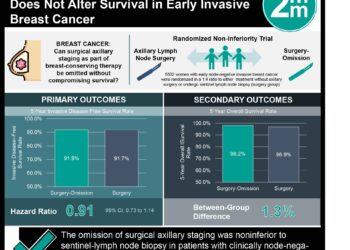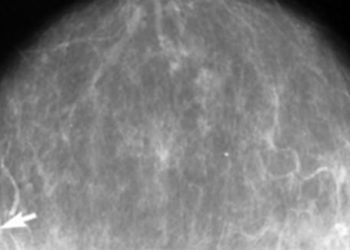Combined anastrozole and fulvestrant therapy found to have improved survival outcomes in metastatic breast cancer
1. A randomized control trial of patients with hormone receptor-positive metastatic breast cancer compared survival outcomes between patients who received combined anastrozole and fulvestrant therapy versus those receiving anastrozole alone, concluded that the combined therapy led to improved disease progression-free survival and overall survival rates.
2. There were no significant differences found in grade 3 or higher toxic side effect rates between groups.
Evidence Rating Level: 1 (Excellent)
Study Rundown: Metastatic hormone-receptor positive breast cancer has long been associated with poor survival outcomes due to resistance to traditional therapies over time. In a breakthrough study first reported in NEJM in 2012, researchers from the S0226 trial indicated that such patients may derive some benefit from a combination therapy including anastrozole (an aromatase inhibitor) and fulvestrant (a selective estrogen receptor degrader). The initial results followed patients for a period of three years and found that the combined therapy led to increased overall survival rates and disease-free progressive survival rates when compared to a group of patients taking anastrozole alone. This current analysis expands on those initial results, including five additional years of follow-up data. Researchers found that their overall survival and disease progression-free survival rates were still higher among patients who received the combined therapy. They also found that the safety profiles of each arm were not significantly different. This study strengthens the case for the use of combined therapy among patients with metastatic hormone-positive breast cancer.
Click to read the study in NEJM
Relevant Reading: Combination Anastrozole and Fulvestrant in Metastatic Breast Cancer
In-Depth [randomized control trial]: This multicenter, open-label randomized control trial enrolled 707 patients between 2004-2009. Patients were assigned in a 1:1 ratio to receive either standard-dose anastrozole alone (n=345) or standard-dose anastrozole plus fulvestrant (n=350), dosed at 500mg on day 1, followed by 250mg administrations on days 14, 28 of treatment, and 250mg every 28 days afterwards for maintenance therapy. Disease progression was assessed at 3 month follow up periods. The primary end point of this study was a comparison of progression-free survival. Secondary endpoints included overall survival rates and comparative safety profiles of each arm. Median follow-up time for this analysis was 7 years. Among 694 patients eligible for data analysis, there were 647 total events of disease progression. A significantly lower number of deaths were noted in the combined therapy group (247 of 349 women, 71%) as compared to the anastrozole only group (261 of 345 women, 76%; HR 0.82; 95% CI 0.69 to 0.98; p=0.03). Additionally, the overall survival in the combination therapy group was 49.8 months versus 42.0 months in the anastrozole only group. The overall median progression-free survival was 15.0 months in the combined therapy group versus 13.5 months in the anastrozole only group (HR 0.81, 95%CI 0.69 to 0.94; p=0.007). Grade 3 or higher toxic effects were noted among 51 of 348 patients (15%) in the combination-therapy group and in 43 of 338 patients (13%) in the anastrozole only group (p=0.47), and included musculoskeletal pain, fatigue, hot flashes, mood alterations, and GI upset. Of note, 45% of patients who were initially in the anastrozole-only group switched over to subsequently receive both anastrozole and fulvestrant therapy, however this did not alter the significance of the overall results.
Image: PD
©2019 2 Minute Medicine, Inc. All rights reserved. No works may be reproduced without expressed written consent from 2 Minute Medicine, Inc. Inquire about licensing here. No article should be construed as medical advice and is not intended as such by the authors or by 2 Minute Medicine, Inc.






